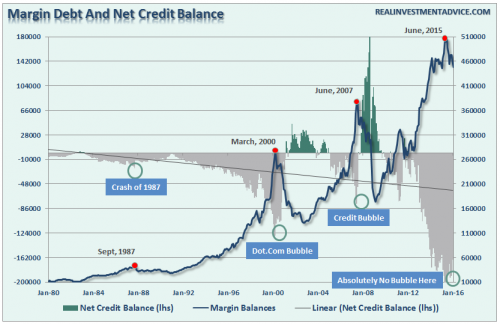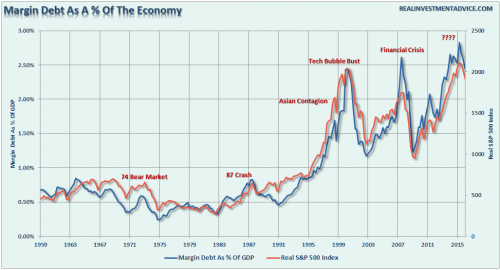News Dump Tuesday: Central Bank Failure Edition
Submitted by gjohnsit on Tue, 03/15/2016 - 1:10pm

Economists are out of touch with climate change
In the debate over climate change, there is one group you don't hear much from: economists. The failure of climate economics to make a difference in the public discussion about climate policy should be a concern for the profession...
Climate economists are just as worried as anyone about the prospect of global warming. A recent survey by the Institute for Policy Integrity found that most climate economists believe climate change is a grave threat. Most supported carbon taxes or cap-and-trade programs to limit emissions, even if these actions were taken unilaterally by the U.S. The consensus view was that a catastrophic loss of global gross domestic product -- a 25 percent decline or more -- is possible under a “business as usual” scenario.
But for all this concern, climate econ research has had little impact on the public debate.
Regrettably, climate economics tends to lag behind climate science, especially in the slow-paced, peer-reviewed economics literature. The analyses rarely portray the most recent advances in climate science; instead, they often incorporate simplified representations of scientific knowledge that is out of date by several years, if not decades. Moreover, climate economics has often been hampered by its uncritical adoption of a traditional cost-benefit framework, minimizing or overlooking the deep theoretical problems posed by uncertainty, intergenerational impacts, and long-term technological change.
How does a significant change in inequality affect the overall level of exchange? Their study makes use of some fairly abstruse mathematics coming from physics, developed precisely for messy network problems of this kind. What they find is troubling, although not all that surprising -- rising inequality tends to undermine exchange.
As inequality gets more pronounced, a larger fraction of the population faces more stringent budget constraints, and the spectrum of possible economic interactions open to them narrows. Fewer people have the wherewithal to engage in economic activity. This mathematical economy actually demonstrates a sharp transition, akin to the abrupt freezing of a liquid, as the level of inequality exceeds a certain threshold. Worryingly, the wealth distribution in the U.S. over the past few decades has been moving ever closer to this critical edge....
The researchers found another interesting effect -- a “trickle up” flow of wealth quite different from the usual “trickle down” picture of supply-side economics. In an economy with appreciable inequality, capital tends to flow from those with less to those with more, generating a cascade of transactions along the way. Hence, policy interventions aiming to spur economic activity should work better if they inject money into the system at the lower end, rather than from the top.
This fits with the argument that quantitative easing -- in which central banks purchase securities -- may ultimately be misguided. Such a policy is supposed to encourage spending by propping up the prices of stocks and bonds, which tends to boost wealth only at the top end of the distribution. Central bankers might have a more powerful and beneficial effect if they instead injected money directly into the accounts of citizens, who could then use it to pay down debts or spend as they like.
All 11 companies running money-market funds stopped accepting new investments, citing the BOJ stimulus. They plan to return money to investors, the Nikkei newspaper reported, and money from the funds is moving to deposits, according to analysts at Deutsche Bank.
While the BOJ’s monetary easing policies are meant to stimulate lending and encourage borrowing, lending growth slowed slightly in February while deposits rose -- the exact opposite of what the bank was aiming for.
With concerns that deposit rates may go below zero, sales of safes are surging. The number of 10,000 bills in circulation in 2015 rose at the fastest pace in more than a decade, which may suggest households are hoarding cash.
Consumers’ and merchants’ sentiment dropped in February, requiring the government to lower its assessment of confidence.
As BlackRock CEO Larry Fink put it in a recent article, "Let's be clear: Negative interest rates are terrible."
While European central bankers first started experimenting with this tool in 2014, the volume of such notes has ballooned in recent months, now accounting for more than 46 percent of all non-U.S. sovereign bonds, according to an analysis by Jim Bianco, president of Bianco Research in Chicago.
"We're making this leap into this unknown and we're trusting that it's all going to work out,'' Bianco said in a phone conversation on Monday. He compared the negative-yield project to the creation of Frankenstein's monster.
As the financial crisis reached a fevered pitch in 2008, the Federal Reserve took to flooding the financial market with dollars by buying up bonds. Simultaneously, interest rates fell dramatically, as bond yields move in the opposite direction of bond prices. Barnier sees the Fed as responsible for over 93% of the market from the start of QE until today. During the first half of 2013, the Fed caused the entire market’s growth, he said.




Comments
gjohnsit,
I love having a separate news dump. You may not get many comments, but I bet everyone appreciates it this setup as much as I do.
You may not get many comments, but I bet everyone appreciates it this setup as much as I do.
Do I hear the sound of guillotines being constructed?
“Those who make peaceful revolution impossible will make violent revolution inevitable." ~ President John F. Kennedy
Sorry I don't have much to say on economic issues...
I'm still at the point when I think we need to reinstate Jubilee and screw over the winners in our economy once every seven years.
I do not pretend I know what I do not know.
Now is the time to form some opinions
because in 6-9 months it'll be a big deal.
It makes me feel I am in the
It makes me feel I am on the path to greater intelligence when I read something by gjohnsit. I often feel like he is the smartest guy in the room, so I try to follow in his footsteps
"If you're on fire, and running down the street, people will get out of your way." Davey- Cordovan Athabascan Native
Maybe they are banking on the global masses being stone
age dwellers with a near zero carbon footprint?
“Tactics without strategy is the noise before defeat.” ~ Sun Tzu
We may wind up at that level, as things are going
And sooner than most people think. I read someone the other day who was recommending that we learn primitive skills. Not sure I could start a fire without matches!
I have now officially seen everything
A place for capitalist potheads
There is something inherently wrong here
There was a time when smoking herb, bud, weed, tea, dope made you part of the underground culture. A bit of an rebel and lawbreaker.
But now you can own a piece of Wall Street Cannabis and have it stuck in your 401K portfolio? Something odd here since weed is not Wall Streets preferred recreational drug.
https://youtu.be/y0CVT5fmFZs
In the "like duh, obviously!"
In the "like duh, obviously!" department:
Crazy talk! It could never work!
/s
If you plant ice, you're gonna harvest wind. -R. Hunter/J. Garcia